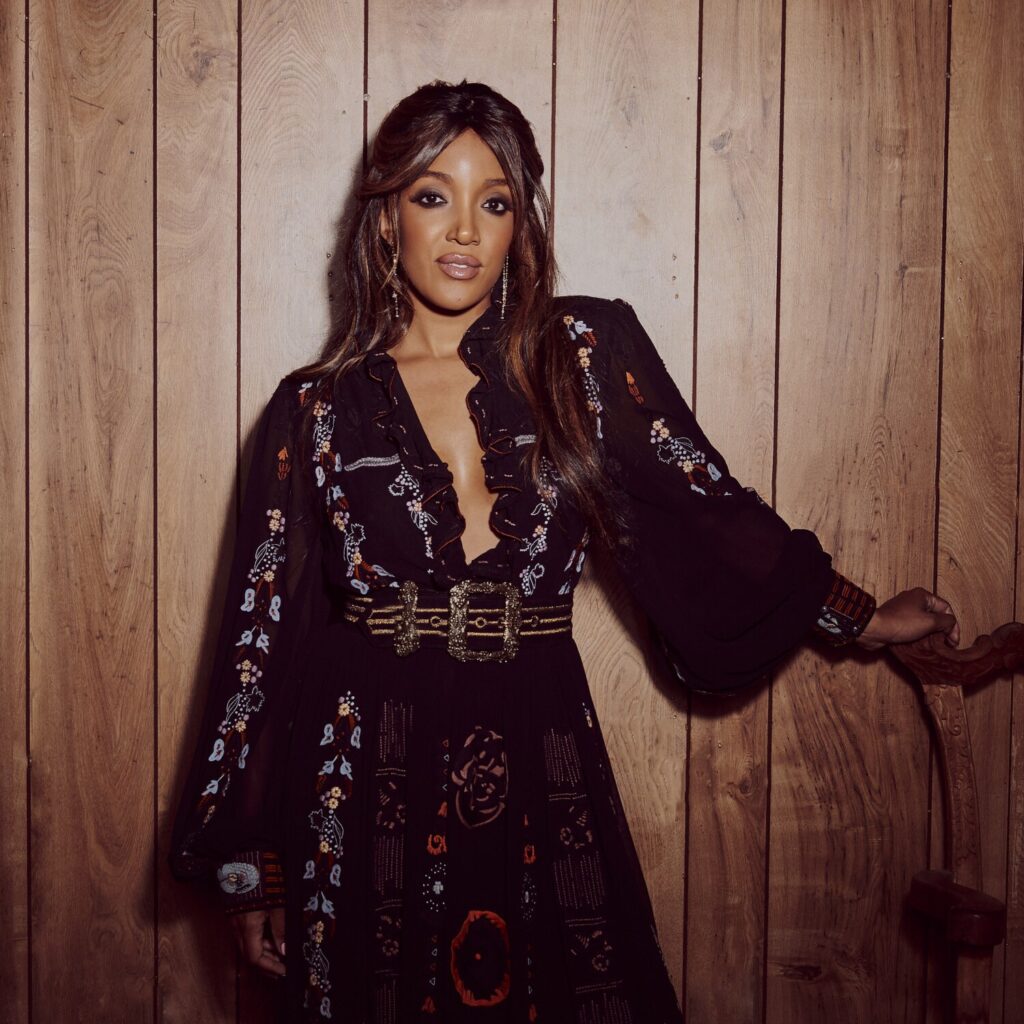Shared from www.latimes.com
Mickey Guyton is known to most as the country singer who broke barriers with her Grammy-nominated song “Black Like Me,” and for her career dedicated to diversifying the overwhelmingly white and male genre. But, in high school back in Texas, she was known as the “national anthem girl.”
“The national anthem is my song,” says Guyton, 38, who will sing “The Star-Spangled Banner” at this Sunday’s Super Bowl at SoFi Stadium in Inglewood. “The first time I sung it was at a basketball game when I was 13, and I kept my eyes closed the whole time. But then they asked me to sing at every game after that.”
Guyton’s musical ambitions began with the anthem, in fact: it was watching LeAnn Rimes belt the song, as a little girl at a baseball game, that hooked Guyton into country music, and it was listening to Whitney Houston’s famous interpretation that showed her that Black women could not only succeed in entertainment but be the best in the game.
“It’s so full circle,” Guyton says via phone from her home in Los Angeles. “It’s really going to show people what I can do, and I hope a lot of fans are going to see me differently.” The industry certainly has started to do so: After a decade trying to break through in Nashville, she’s up for three Grammy Awards this spring, including best country album for “Remember Her Name.” She’s also the second country singer in a row to tackle the anthem at the Super Bowl — Eric Church performed it last year, alongside Jazmine Sullivan.
Given country music’s complex relationship with patriotism — and her own — Guyton has been carefully reflecting on exactly what it means to sing about the “land of the free” when she’s living “black like me,” a couplet she’s rhymed and ruminated on before.
“What does patriotism mean? Anybody can wave a flag, but is that patriotism?” she asks. “I can buy a flag right now on Amazon, so is that patriotism? For me, it’s deeper. I feel like a patriot is loving everybody, a patriot is someone who sees people hurting and wants to do everything in their power to fix it. And patriotism is inclusion.”
Are you doing anything special to prepare for this performance?
I’ve been working with a creative director because there is something very specific I want to come across. Our country has been so divided for so long and it’s been very hard to watch. I’m just trying to unite people.
Singing about the American experience is important to you — your album includes a song called “All-American” that’s your own version of what a patriotic country song can be. But it’s not just blind worship: It focuses on how we’re all united because of our differences, not despite them.
One hundred percent. I want to be able to proudly wave my American flag and sometimes it’s really difficult to do, watching what’s going on in this country. That doesn’t mean I don’t love it here, it just means we have a lot of work to do. It’s equivalent to me finding success in my musical career: It’s great and fine, but then I am still seeing my Black and brown brothers and sisters, and even white women in country music, not get the same opportunities. Or knowing there are currently kids in food deserts. We all can do better.
Whitney’s version of the anthem resonated not just because of her incredible vocals but how she was able to translate those nuanced emotions into her performance.
I’ve heard a lot of anthems, but I feel like she evoked the truest meaning of America when she sang it. I felt so proud to be an American after that. I was like, “Yes! America”! That’s what I want, to feel that again. I want everyone to feel that again.
You just taped an appearance at another quintessential, and uniting, American experience: “Sesame Street.”
I have done a lot of incredible things, but next to my marriage to my husband and the birth of my son, that was one of the coolest moments I’ve ever experienced. You literally turn into a child again. And “Sesame Street” has always been big on inclusion. Everybody could learn a thing or two from “Sesame Street.”
On top of that, you were nominated for three Grammy awards. How did you react when you found out?
I was on a flight to New York so I had to silently celebrate because I didn’t want to get kicked off and stress out all of the passengers. I don’t want to say I felt validated, but I felt validated. I might not get the radio airplay, but people recognize me for the work I’m doing. And that is everything to me.
Are you working on a follow-up to “Remember Her Name” yet?
I’m working on a lot of new stuff. I really want to release music consistently the way those in the hip-hop industry do, so I have a few songs I am getting ready to release. I want to put out an EP or two. And I am working on a lot of stuff for film and television. I found a little niche for me in that world that I was not expecting, and I hope that shows other women in country music that there are other ways to succeed. If you can pay a man $100 million for a podcast, you can pay creatives who are putting their souls and lives into their music.
Images and Article from www.latimes.com

